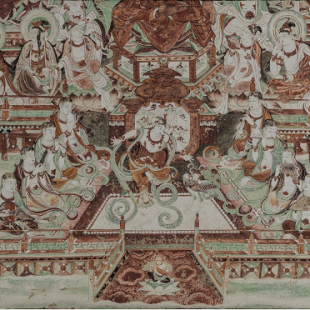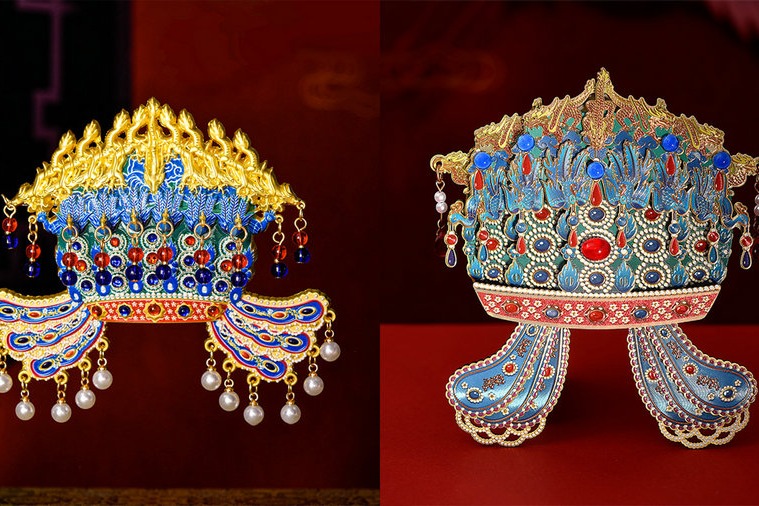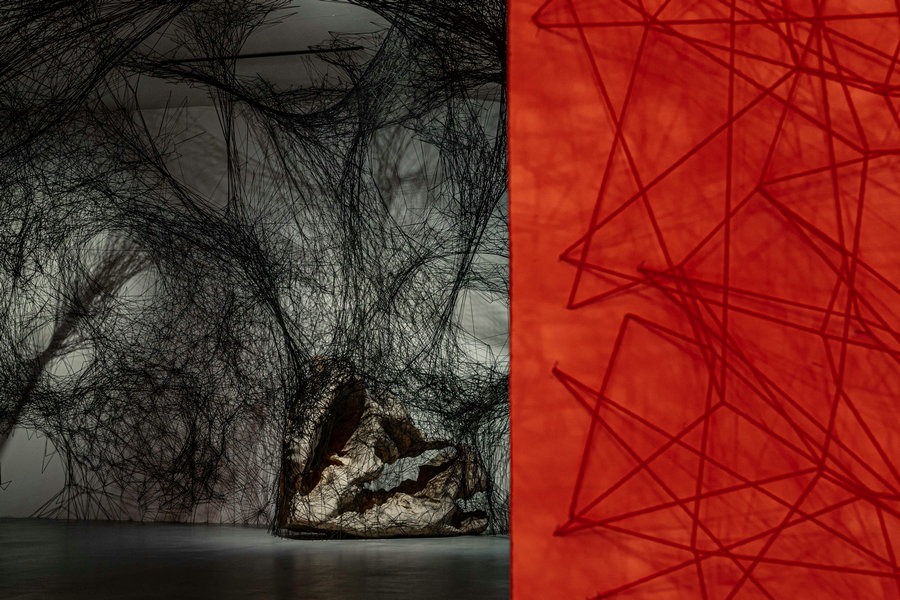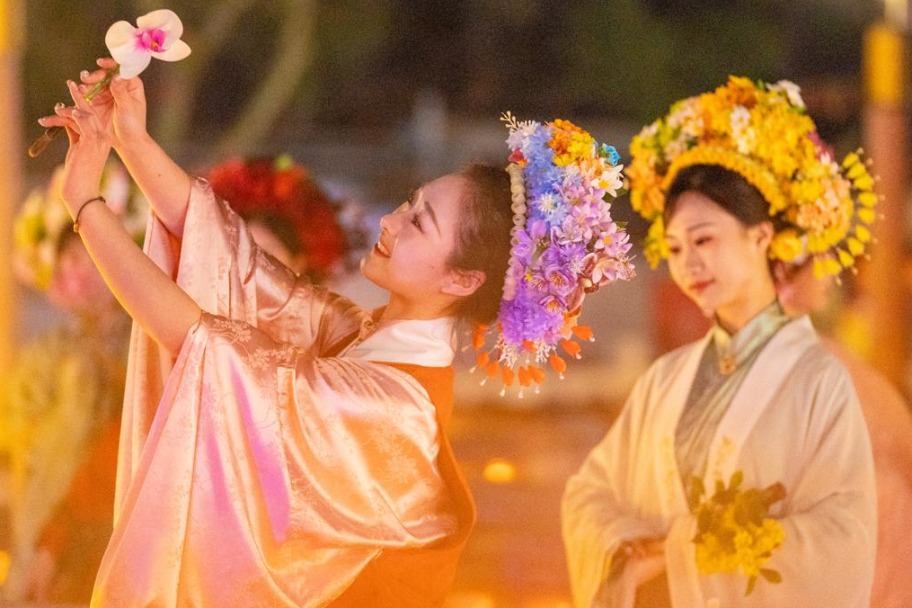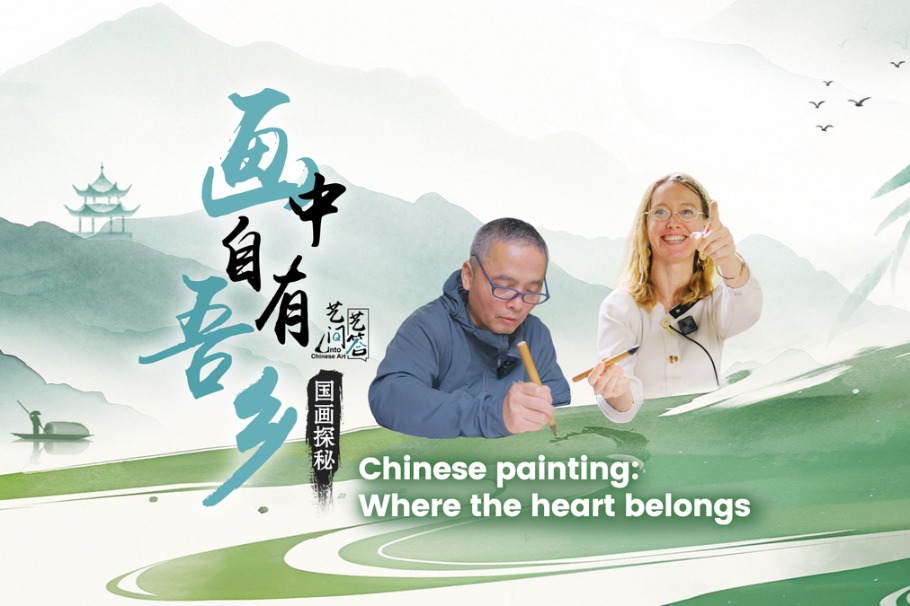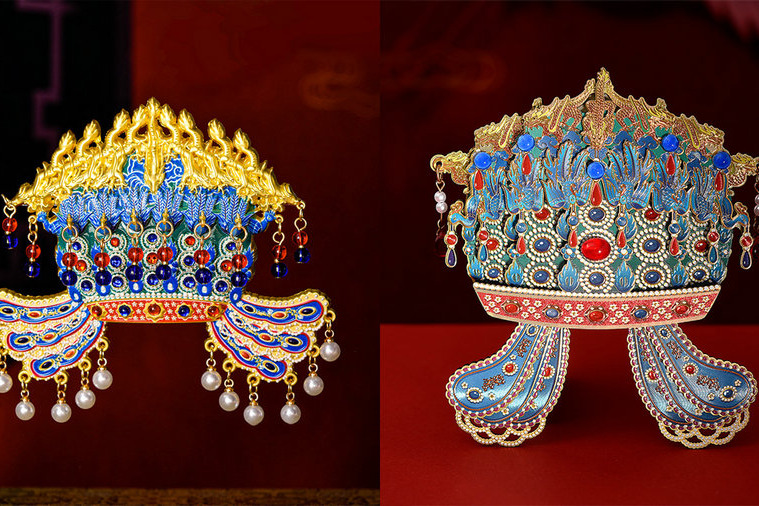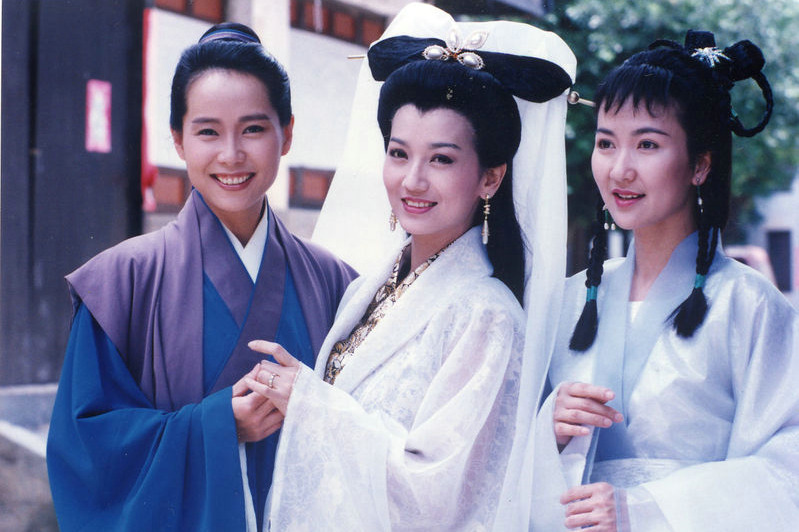From the ancient Silk Road to Paris: The allure of murals


On Sept 18, the Silk Road Danqing – Exhibition of Murals along the Ancient Silk Road opened at the China Cultural Center in Paris, France.
Initiated by the Chinese National Academy of Arts and co-hosted by the China Cultural Center in Paris, the exhibition showcases reproductions of murals from key sites along the Silk Road, featuring 23 reproduced murals from regions including Qiuci, Gaochang, Yanqi, and Yutian in Xinjiang, as well as Dunhuang in Gansu that span 1,000 years, from the third to 13th centuries.
More than 160 Chinese and French guests attended the opening ceremony and viewed the exhibition, where curator Zhang Jian explained that, due to transport and gallery limitations, larger works could not be included.
The exhibition, which runs until Sept 24, offers French audiences a glimpse into the rich cultural heritage of the ancient Silk Road.
Zhou Qingfu, director of the Chinese National Academy of Arts, said: "The rich variety of character designs and the flexibility of styles and forms not only directly reflect the exquisite craftsmanship of traditional murals but also highlight the unique features that emerged from the exchange and fusion of Eastern and Western cultures."
Liu Hongge, director of the China Cultural Center in Paris, said the Silk Road murals are a mark of mutual learning and integration between Chinese and Western civilizations.
Didier Bernheim, a member of the Academy of Fine Arts of the Institute of France, said: "These works, crafted with great finesse and unmatched artistic richness, tell stories thousands of years old while serving as a living connection between the past and present."
And Bernheim praised the restoration techniques used by the Chinese National Academy of Arts, describing them as cutting-edge.
"France and China share a deep attachment to their cultural heritage, and I hope that our two countries can continue to collaborate in the protection and promotion of the arts," he added.
Thierry Prouvost, founder and president of the Association of Lineages of France, added: "These works are not merely art on walls; they are witnesses of time, reflecting eras, civilizations, and beliefs."
Colette Illouz, a former marketing director at an insurance company, attended the exhibition and said she was pleasantly surprised by the quality of the work.
"When I listened to our guide, I learned that these murals predate even Marco Polo," she said.
Michel Combredet, who accompanied Illouz, was impressed by the finesse of the lines of the paintings.
"I even believed, at one point that the reproductions were made of paper, and I was told that it was really mineral. It struck me. I hadn't imagined it," he said.
Representative murals
Curator Zhang Jian emphasized that the exhibition follows a logical narrative of time and space, using murals as important physical artifacts to weave together a cultural Silk Road. The murals vividly reflect the social customs, ethnic transitions, ideological concepts, and other cultural phenomena of their time, Zhang said, while highlighting three works that best represent the exhibition.
The first, Procession of Zhang Yichao in Cave 156 of the Mogao Grottoes, vividly depicts the majestic momentum of Zhang Yichao leading an army to fight against the Kingdom of Tibet and recover Hexi. The painting provides insight into the ceremonial practices of the Tang Dynasty (618-907) military, as well as the era's cultural and ethnic diversity.
The second, Music and dance performance in Yulin Cave 25, from the Tang Dynasty features lively figures, delicate lines, and rich colors, capturing the essence of Tang Dynasty music and dance. It reflects the cultural integration and aesthetic tendencies of the era while providing a glimpse into the dynamic social landscape of the time, Zhang said.
The third, Thousand-hand Guanyin from the Damagou Buddhist Temple Remains in Hotan, Xinjiang, is unlike the other pieces, which are replicas of murals from original sites. This piece is a copy of a mural that is currently preserved in the Hotan Museum. The Damagou Buddhist Temple, which dates back to the Southern and Northern dynasties (420-581), is the smallest known Buddhist temple from the medieval period, both in China and globally.
In this particular piece, Guanyin has a full face, slightly arched eyebrows, a small mouth, a small nose, long and slender eyes that are half-open, gazing slightly downward with the corners of the eyes slightly raised, and a vertically open eye in the middle of the forehead. One of her left hands holds a moon, featuring a rabbit pounding medicine, while one of her right hands holds a spherical object, likely the sun. The mural's elegant colors and harmonious lines reflect the distinct style of Khotanese Buddhist art from this period.
Dedicated work
Since 2016, the Gongbi Painting Institute of the Chinese National Academy of Arts has led the ancient Silk Road mural reproduction project.
More than 200 meticulously selected mural experts have been involved in the vast project, conducting research across more than 10 countries along the ancient Silk Road and in at least 20 cities and regions in China.
The project has completed academic reproductions of murals from more than 30 grottoes, temples, and tombs, ranging from large-scale masterpieces to small fragments. It is the world's largest mud-based mural reproduction project.
"We began our reproductions in Xinjiang. In particular, the Kizil Caves were the first stop for Buddhism entering China, where the earliest murals can be found. Then there's the Dunhuang Caves, another key site along the Silk Road in the Hexi Corridor," explained mural copyist Han Maoyuan. He added that the images chosen for reproduction must align with their aesthetic standards, have strong artistic value and a high degree of completeness, or represent endangered murals.
To faithfully reproduce the murals, the copyists used local mineral materials to capture the original works' authenticity as closely as possible.
"If we used paper for reproduction, it wouldn't fully capture the murals' current appearance," said Han, who explained that the original murals could be seen as a type of shallow relief, having undergone weathering and the passage of time.
"Their surface holds not only the information of the mural itself but also the traces of history, including restoration details which we need to replicate," he said. To ensure the colors are accurate, the copyists also take color reference cards into the caves, ensuring consistency under the same lighting conditions. Additionally, the artists face challenging working conditions, as they often work on-site in desert locations. A small-scale copy by a single artist usually takes two to three months to complete, while larger works, involving multiple artists, can take several months.
Han said the mural reproduction project will continue. One of the team's current endeavors is a collaboration with the Metropolitan Museum of Art in New York, where members aim to reproduce a large-scale Yuan Dynasty mural from Guangsheng Temple in Shanxi, China, titled Buddha of Medicine Bhaishajyaguru (Yaoshi fo).
"Our ultimate goal is to deepen the common emotional resonance and cultural understanding among humanity in the context of the integration of civilizations," concluded Zhou.


